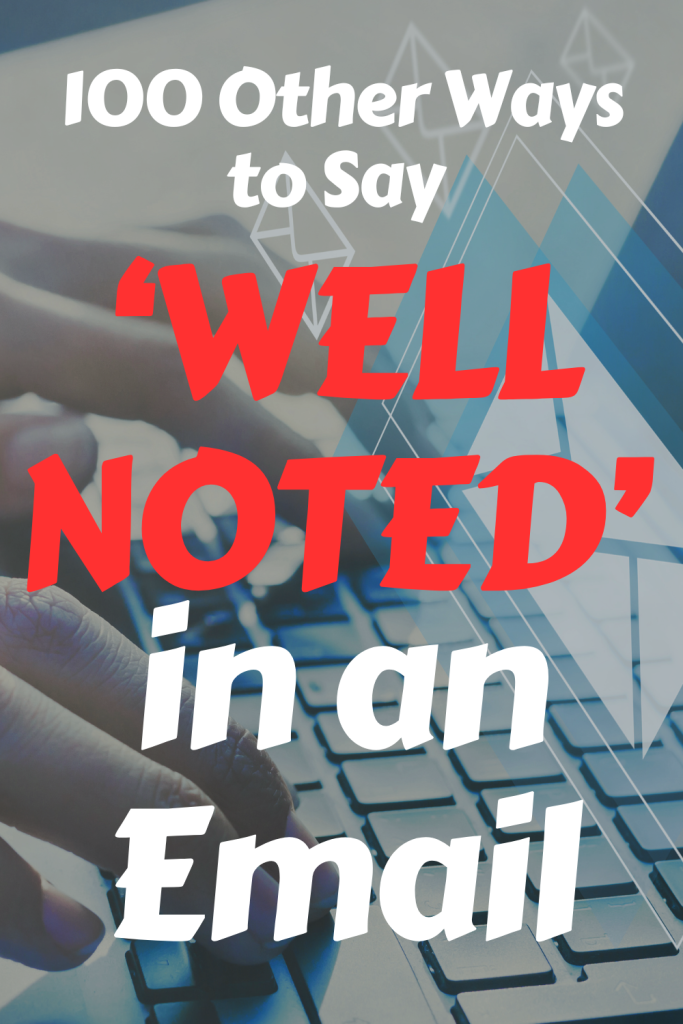Emails are a cornerstone of modern communication, especially in professional settings. Whether you’re responding to a colleague, confirming details with a client, or acknowledging instructions from a manager, how you phrase your replies matters. It reflects not just your understanding, but also your professionalism, tone, and attention to detail.
One commonly used phrase in email exchanges is “Well noted.” It’s a concise way to acknowledge information, but let’s face it—it can feel repetitive, overly formal, or even impersonal when overused. That’s where variety comes in. By using other ways to express the same idea, you can add polish, tailor your tone to suit the context, and keep your emails engaging.
This article will guide you through 100 other ways to say well noted in an email that fit a range of situations—from formal and professional to casual and friendly. Whether you’re aiming to acknowledge receipt of an email, express understanding, or confirm your commitment to an action, there’s a phrase here to suit your needs.
Let’s explore how you can make your email communication more professional, polished, and impactful by replacing “Well noted” with phrases that convey the same message while adding a touch of variety and personality.

Also check;https://copyenglish.com/amazing-ways-to-say-well-noted-in-an-email/
Why Learning These Alternatives Matters for Your Professional Growth
Expanding your vocabulary for email communication helps you stand out as a thoughtful and effective communicator. By replacing repetitive phrases like “Well noted” with tailored alternatives, you can demonstrate professionalism, adaptability, and attention to detail. This skill not only enhances the clarity and tone of your emails but also fosters stronger relationships with colleagues, clients, and stakeholders.
Professional and Formal Alternatives
Acknowledging Receipt of Information
When writing professional emails, acknowledging receipt of information concisely and respectfully is crucial. Here are some polished ways to convey that the message has been received and understood:
- “Duly noted” – A formal way to confirm you’ve received and understood the message.
- “Acknowledged” – A simple, professional acknowledgment.
- “Understood” – To indicate comprehension of the details provided.
- “Received with thanks” – Polite and formal, expressing gratitude alongside acknowledgment.
Expressing Commitment to Action
Sometimes, it’s necessary to confirm not only that you’ve noted the information but also that you plan to act on it. These phrases help communicate your readiness to proceed:
- “I’ll take note of this” – Shows attentiveness and intent to remember or act on the details.
- “This has been recorded” – A formal way to indicate the information has been officially documented.
- “Actioning as discussed” – Highlights that you are actively addressing the matter.
Polite and Neutral Phrases
Everyday Polite Responses
Politeness is the cornerstone of effective communication. These neutral phrases are suitable for various contexts:
- “Got it” – Polite and simple, often used in professional settings.
- “Noted” – Straightforward and clear.
- “Thanks for letting me know” – Acknowledges receipt with a touch of gratitude.
- “I see” – Indicates understanding of the provided information.
When Expressing Gratitude
When an email conveys helpful information or guidance, it’s good to show appreciation:
- “Thank you for the information” – Formal and gracious.
- “Thanks for sharing this” – Expresses gratitude for receiving useful details.
- “Much appreciated” – A succinct and polite way to say you value the message.
Casual or Friendly Alternatives

Relaxed Acknowledgements
For less formal exchanges, such as emails with colleagues or close associates, these phrases work well:
- “Gotcha” – Friendly and casual, implying full understanding.
- “Cool, thanks” – A relaxed acknowledgment with a note of appreciation.
- “Sure thing” – Informal but clear and affirmative.
- “Alrighty” – Cheerful and laid-back, ideal for casual correspondence.
Creative and Contextual Responses
For Specific Situations or Tone Variations
Tailoring your acknowledgment to fit the specific situation can leave a stronger impression:
- “Consider it done” – Confident and action-oriented.
- “Loud and clear” – Acknowledges clarity of instructions or messages.
- “I’m on it” – Assures prompt action.
- “Noted and understood” – Conveys comprehension and readiness to proceed.
Cultural and Regional Variations
Global Expressions for Acknowledgment
Acknowledgment styles can differ across cultures and regions. Using these variations can make your communication more relatable:
- “Cheers” – Commonly used in the UK and Australia to mean “thanks” or “noted.”
- “Noted, mate” – A casual Australian variation.
- “Alright, got it” – A friendly American phrase.
- “Copy that” – Inspired by military jargon, often used in professional contexts to confirm receipt of instructions.
Alternatives with a Personal Touch
Acknowledging a Specific Detail or Instruction
Sometimes it’s effective to personalize your acknowledgment to reference specific details:
- “I’ve noted the deadline” – Highlights that you’re aware of the critical timeline.
- “I’ll remember this for our meeting” – Shows attentiveness and preparedness.
- “Got it—will do as requested” – Confirms receipt and emphasizes intent to follow instructions.
Emphasizing Understanding or Agreement
In some cases, you may need to confirm not just receipt but full understanding or agreement:
- “Understood completely” – A reassuring and clear response.
- “That makes sense” – Indicates comprehension and alignment.
- “Noted and agreed” – Formal and decisive.
Alternative Phrases for Follow-Up Emails
Reconfirming Receipt or Action
When following up on earlier correspondence, these phrases reinforce your acknowledgment and confirm ongoing action:
- “As previously noted” – A professional reminder referencing past communication.
- “Just to confirm I’ve taken note” – Reassures the recipient of your attentiveness.
- “Following up on the noted point” – Demonstrates a proactive approach to addressing the matter.
Conclusion: 100 Other Ways to Say ‘Well Noted’ in an Email
Emails are a vital tool for communication in both professional and personal contexts. How you phrase your responses can significantly impact how your message is received. By expanding your vocabulary and replacing “Well noted” with one of the many alternatives shared in this article, you can elevate your email etiquette, demonstrate professionalism, and build stronger connections with your recipients.
Whether you need a formal acknowledgment, a casual reply, or a creative way to express your understanding, the options provided here ensure you have the perfect phrase for every situation. From “Duly noted” in a business setting to “Gotcha” in a friendly exchange, the variety keeps your communication fresh and adaptable.
Remember, the key is to choose a phrase that suits the tone, context, and audience of your email. By doing so, you show not only attentiveness but also respect for the recipient. Explore, experiment, and embrace these alternatives to make your emails polished, engaging, and professional.
So next time you’re about to type “Well noted,” consider switching it up—you’ll leave a lasting impression with just a few thoughtful words.
Check more expression alternatives;100 Other Ways to Say Have a Good Day and Spread Positivity